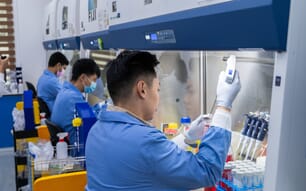The centre will house the Southeast Asia Centre of Kinki University Fish Nursery Centre, which is the first overseas operation of the university’s fisheries laboratory, reports the BorneoPost.
Following the signing of the MoA, the centre will conduct research of seedling production and quality improvement of humphead wrasse (Napoleon fish), grouper and catfish. The centre will also pursue fry production of the Southeast Asian eel in the future.
Deputy secretary general of the Ministry of Higher Education, Datuk Nik Ali bin Mat Yunis, hoped that the bilateral research and development (R&D) strategic cooperation in the field of aquaculture between UMS and Kinki University through the establishment of this centre would provide a strong foundation for the future development of aquaculture industry of both countries.
He believed that the establishment of the UMS-Kinki University Aquaculture Development Centre would serve several objectives, including strengthening R&D of both universities as well as facilitating access to know how and sharing expertise.
In addition, he said the centre would prioritize specific areas of projects aimed at tackling major challenges to maximize the socio economic impacts and help policy makers in various agencies in reformulating their priority by strategically focusing on a research and innovation driven economy.
“As such, greater collaboration on aquaculture R&D, exchange of technical know-how and sharing of information between UMS and Kinki University are in tandem with the current objective of Malaysian higher education policy to promote innovation ecosystem and global prominence,” Nik Ali said when officiating at the event at the fish hatchery at Borneo Marine Research Institute (BMRI), UMS, here yesterday.
Nik Ali said the aquaculture industry was relatively important to domestic, regional and international economic activities as it was closely related to the source of food and high quality protein.
“To ensure orderly and sustainable development of the industry, aquaculture scientists and industry players must work together in formulating the best strategic direction not only in R&D activities but also in the area of marketing and supply chain management network,” he said.
Dr Hitoshi is confident that the signing of the agreement would help strengthen the university’s long-standing cooperative relationship with UMS.
“I have high hopes for the development of aquaculture technology and the educational collaboration of both our faculties, and hope that fish cultivation can contribute to solving the anticipated food shortage crisis caused by global human population growth.
“In particular, we plan to start research on the seedling production and quality improvement of Napoleon fish, grouper and African catfish, which all have high demand in Southeast Asia.
“In the future, we will attempt to develop full-cycle aquaculture technology for production of eels in Southeast Asia,” he said.




